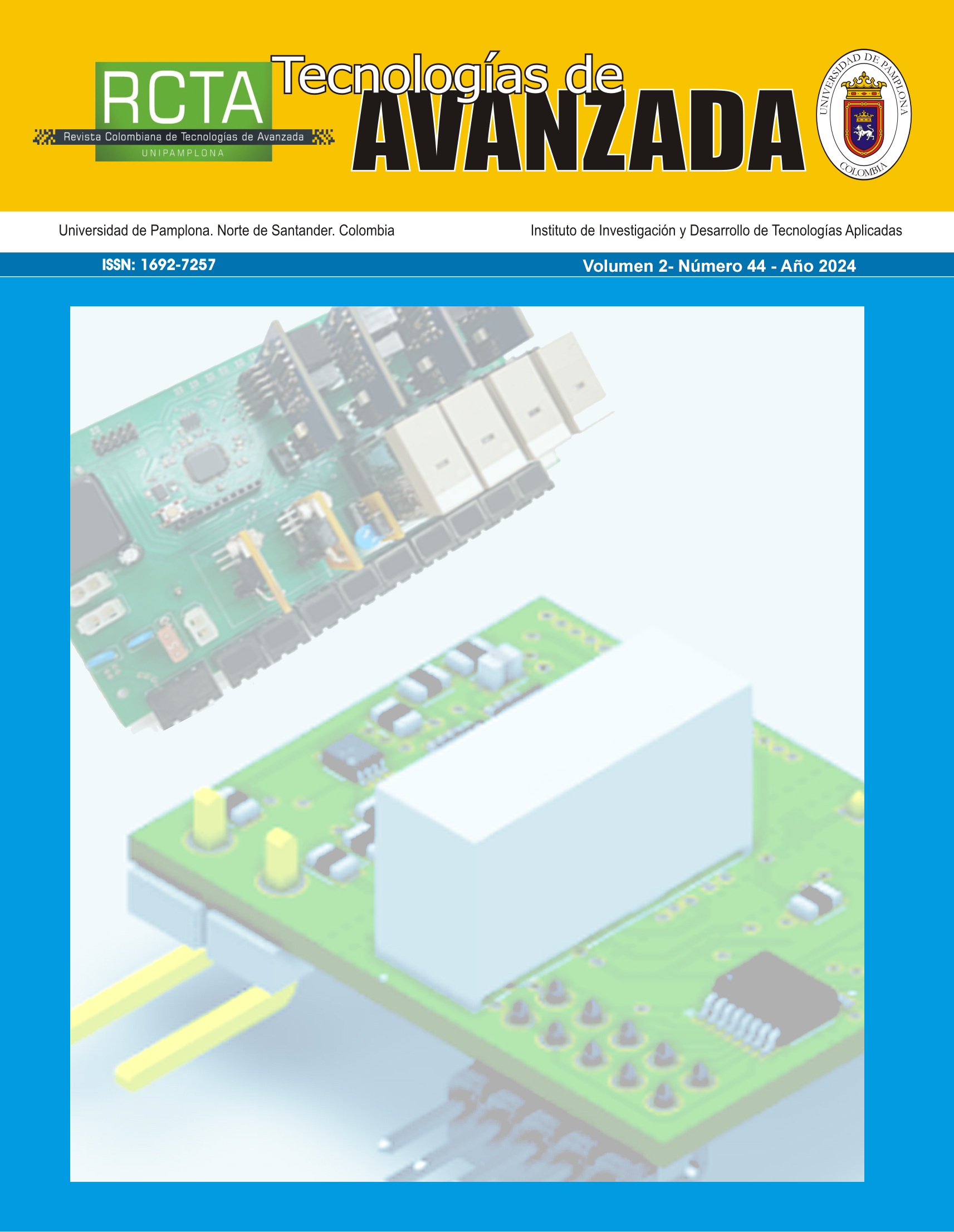Análisis e implementación de clustering en casos de dengue mediante algoritmo de aprendizaje no supervisado
DOI:
https://doi.org/10.24054/rcta.v2i44.3021Palabras clave:
Aprendizaje No Supervisado, Clustering, Dengue, SegmentaciónResumen
Este estudio se enfoca en la aplicación de algoritmos de aprendizaje no supervisado, específicamente técnicas de clustering para analizar la incidencia del dengue en San Juan, Puerto Rico, e Iquitos, Perú. El objetivo principal es probar la eficacia de estos algoritmos en la identificación de patrones ocultos en el conjunto de datos, compuesto por información ambiental, climática y casos de dengue. La investigación permitió comprobar la importancia de seleccionar la técnica de clusterización adecuada, evidenciada por el rendimiento variable de los métodos utilizados. Los resultados revelan la utilidad del aprendizaje no supervisado para comprender la propagación del dengue, resaltando la necesidad de considerar cuidadosamente la elección del algoritmo para análisis epidemiológicos y ambientales futuros.
Descargas
Referencias
J. Quddus, Machine Learning with Apache Spark Quick Start Guide: Uncover Patterns, Derive Actionable Insights, and Learn from Big Data Using MLlib. Birmingham, UNITED KINGDOM: Packt Publishing, Limited, 2018. [Online]. Available: http://ebookcentral.proquest.com/lib/universidadviu/detail.action?docID=5626693
J. Bell, Machine Learning: Hands-On for Developers and Technical Professionals. Somerset, UNITED STATES: John Wiley & Sons, Incorporated, 2014. [Online]. Available: http://ebookcentral.proquest.com/lib/universidadviu/detail.action?docID=1818248
U. N. Dulhare, K. Ahmad, and K. A. Bin Ahmad, Machine Learning and Big Data: Concepts, Algorithms, Tools and Applications. Newark, UNITED STATES: John Wiley & Sons, Incorporated, 2020. [Online]. Available: http://ebookcentral.proquest.com/lib/universidadviu/detail.action?docID=6268187
R. Gopalakrishnan and A. Venkateswarlu, Machine Learning for Mobile: Practical Guide to Building Intelligent Mobile Applications Powered by Machine Learning. Birmingham, UNITED KINGDOM: Packt Publishing, Limited, 2018. [Online]. Available: http://ebookcentral.proquest.com/lib/universidadviu/detail.action?docID=5628277
R. Karim, Machine Learning with Scala Quick Start Guide: Leverage Popular Machine Learning Algorithms and Techniques and Implement Them in Scala. Birmingham, UNITED KINGDOM: Packt Publishing, Limited, 2019. [Online]. Available: http://ebookcentral.proquest.com/lib/universidadviu/detail.action?docID=5764277
M. A. Jabbar, Machine Learning Methods for Signal, Image and Speech Processing. Aalborg, DENMARK: River Publishers, 2021. [Online]. Available: http://ebookcentral.proquest.com/lib/universidadviu/detail.action?docID=29002971
O. Campesato, Artificial Intelligence, Machine Learning, and Deep Learning. Bloomfield, UNITED STATES: Mercury Learning & Information, 2020. [Online]. Available: http://ebookcentral.proquest.com/lib/universidadviu/detail.action?docID=6032875
W.-M. Lee, Python Machine Learning. Newark, UNITED STATES: John Wiley & Sons, Incorporated, 2019. [Online]. Available: http://ebookcentral.proquest.com/lib/universidadviu/detail.action?docID=5747364
Z. Nagy, Artificial Intelligence and Machine Learning Fundamentals: Develop Real-World Applications Powered by the Latest AI Advances. Birmingham, UNITED KINGDOM: Packt Publishing, Limited, 2018. [Online]. Available: http://ebookcentral.proquest.com/lib/universidadviu/detail.action?docID=5620491
E. Jurczenko, Machine Learning for Asset Management: New Developments and Financial Applications. Newark, UNITED STATES: John Wiley & Sons, Incorporated, 2020. [Online]. Available: http://ebookcentral.proquest.com/lib/universidadviu/detail.action?docID=6268186
G. Kyriakides and K. G. Margaritis, Hands-On Ensemble Learning with Python: Build Highly Optimized Ensemble Machine Learning Models Using Scikit-Learn and Keras. Birmingham, UNITED KINGDOM: Packt Publishing, Limited, 2019. [Online]. Available: http://ebookcentral.proquest.com/lib/universidadviu/detail.action?docID=5837325
K. Ramasubramanian and J. Moolayil, Applied Supervised Learning with R: Use Machine Learning Libraries of R to Build Models That Solve Business Problems and Predict Future Trends. Birmingham, UNITED KINGDOM: Packt Publishing, Limited, 2019. [Online]. Available: http://ebookcentral.proquest.com/lib/universidadviu/detail.action?docID=5784240
H. Gutierrez-Barbosa, S. Medina-Moreno, J. C. Zapata, and J. V Chua, "Dengue Infections in Colombia: Epidemiological Trends of a Hyperendemic Country," Trop Med Infect Dis, Vol. 5, No. 4, 2020, DOI: 10.3390/tropicalmed5040156.
R. Gangula, L. Thirupathi, R. Parupati, K. Sreeveda, and S. Gattoju, "Ensemble machine learning based prediction of dengue disease with performance and accuracy elevation patterns," Mater Today Proc, vol. 80, pp. 3458–3463, 2023, doi: https://doi.org/10.1016/j.matpr.2021.07.270.
S. Mehrotra and A. Grade, Apache Spark Quick Start Guide: Quickly Learn the Art of Writing Efficient Big Data Applications with Apache Spark. Birmingham, UNITED KINGDOM: Packt Publishing, Limited, 2019. [Online]. Available: http://ebookcentral.proquest.com/lib/universidadviu/detail.action?docID=5675596
S. Maldonado, Analytics and Big Data: Data Science applied to the business world. RIL editors, 2022. [Online]. Available: https://elibro.net/es/lc/biblioupc/titulos/225562
E. Alogogianni and M. Virvou, "Addressing the issue of undeclared work – Part I: Applying associative classification per the CRISP-DM methodology," Intelligent decision technologies, vol. 15, no. 4, pp. 721–747, 2021.
W. Y. Ayele, "Adapting CRISP-DM for Idea Mining: A Data Mining Process for Generating Ideas Using a Textual Dataset," International Journal of Advanced Computer Science and Applications, Vol. 11, No. 6, 2020, doi: https://doi.org/10.14569/IJACSA.2020.0110603.
J. A. Castillo Romero, Big data. IFCT128PO. IC Editorial, 2019. [Online]. Available: https://elibro.net/es/lc/biblioupc/titulos/124254
A. So, T. V. Joseph, R. Thas John, A. Worsley, and S. Asare, The Data Science Workshop: A New, Interactive Approach to Learning Data Science. Birmingham, UNITED KINGDOM: Packt Publishing, Limited, 2020. [Online]. Available: http://ebookcentral.proquest.com/lib/universidadviu/detail.action?docID=6033288
H. Wiemer, L. Drowatzky, and S. Ihlenfeldt, "Data Mining Methodology for Engineering Applications (DMME)—A Holistic Extension to the CRISP-DM Model," Applied Sciences, Vol. 9, No. 12, 2019, doi: https://doi.org/10.3390/app9122407.
M. T. H. Suhendar and Y. Widyani, "Machine Learning Application Development Guidelines Using CRISP-DM and Scrum Concept," in 2023 IEEE International Conference on Data and Software Engineering (ICoDSE), 2023, pp. 168–173. doi: 10.1109/ICoDSE59534.2023.10291438.
A. Cheng, "Evaluating Fintech industry's risks: A preliminary analysis based on CRISP-DM framework," Financ Res Lett, vol. 55, p. 103966, 2023, doi: https://doi.org/10.1016/j.frl.2023.103966.
C. Schröer, F. Kruse, and J. M. Gómez, "A Systematic Literature Review on Applying CRISP-DM Process Model," Procedia Comput Sci, vol. 181, pp. 526–534, 2021, doi: https://doi.org/10.1016/j.procs.2021.01.199.
V. Plotnikova, M. Dumas, and F. P. Milani, "Applying the CRISP-DM data mining process in the financial services industry: Elicitation of adaptation requirements," Data Knowl Eng, vol. 139, p. 102013, 2022, doi: https://doi.org/10.1016/j.datak.2022.102013.
Descargas
Archivos adicionales
Publicado
Número
Sección
Licencia
Derechos de autor 2024 Miguel Alberto Rincón Pinzón, Carlos Alberto Mejía Rodríguez, Erney Alberto Ramírez Camargo, Lina Marcela Arévalo Vergel

Esta obra está bajo una licencia internacional Creative Commons Atribución-NoComercial 4.0.











